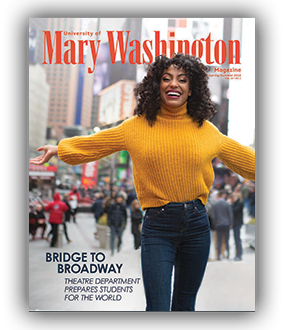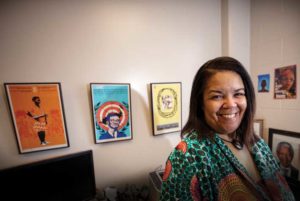By Edie Gross
Raised in the tiny town of Kilmarnock on Virginia’s Northern Neck, Dawne Y. Curry ’90 was a shy teenager in search of a small-college experience when she arrived at Mary Washington as a freshman.
It’s fair to say she’s come out of her shell.
These days, Curry feels most at home in Johannesburg, South Africa, a bustling urban center of more than 9 million people – a fair number of whom she’s interviewed over the last 20 years while gathering stories of female empowerment and anti-apartheid activism.
“I love talking to people and getting intimate stories of history and seeing how people shape or preserve their memories,” said Curry, a University of Nebraska-Lincoln history and ethnic studies professor spending the 2017-18 school year in South Africa as a Fulbright recipient. “It’s very important to me that the voices of Africans are heard in my work. How am I going to teach African history if I haven’t been here?”
At Mary Washington, Curry majored in international affairs and Spanish, thinking at first that she might like to pursue a job as a Spanish interpreter for the United Nations. She also was keenly interested in the American civil rights movement, “but college exposed me to the anti-apartheid struggle going on” in South Africa, she said. Her interest piqued, Curry earned a master’s degree in international affairs and African studies from Ohio University and a doctorate in African history at Michigan State.
“If it wasn’t for that beginning at Mary Washington, I might not have had the courage to go to Michigan State. Having that foundation really helped a lot,” she said.
Curry took her first trip to South Africa as a graduate student in 1997, supported by a Social Science Research Council pre-dissertation fellowship.
Since then she’s received grants and fellowships for several return trips to South Africa, where her research primarily focuses on resistance and the struggle for human rights. In her 2012 book, Apartheid on a Black Isle: Removal and Resistance in Alexandra, South Africa, Curry examined the key role played by residents of a black and mixed-race township outside Johannesburg in reversing the scourge of apartheid.
The focus of her Fulbright research – and her next book – is the many ways women contributed to political thought and activism in the five decades between the creation of the Union of South Africa in 1910 and the rise of apartheid and so-called “pass laws,” which required black residents to carry identity papers at all times when traveling through white neighborhoods, under penalty of arrest. She spends her days examining archived letters, diaries, and newspaper articles, interviewing residents and historians, and soaking up the culture at jazz clubs and theaters.
“To me, Johannesburg is home. It has the pulse of the people. It’s edgy. I just like the humanity of the place,” Curry said. “Being here serves my creativity as a scholar and a person. It’s like the water in Virginia … it just stirs something in you.”

